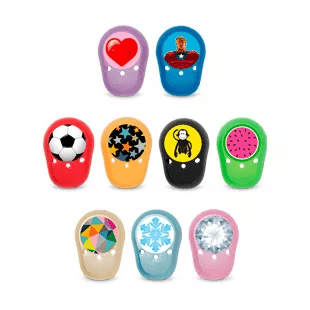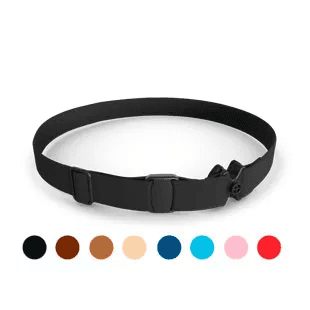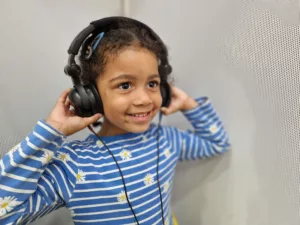In toddlers, glue ear can cause a mild to moderate hearing loss which in turn could result in speech delay or speech regression.
As a paediatric audiologist, I understand that glue ear can be a frustrating condition for parents and caregivers. It occurs when the middle ear fills with fluid, leading to a buildup of pressure that can cause temporary hearing loss. This can be especially challenging for toddlers who are still learning to communicate.
After the diagnosis of glue ear in clinic, here 10 practical strategies I advise parents to follow to help with the child’s language skills:
1. Consider temporary hearing aids for your child


How much would you hear if you had your head under water and someone was speaking from above? I know right! It’s almost impossible to imagine hearing anything in that condition. While the hearing loss associated with glue ear is not as severe, the point is, there is water (sticky fluid) in the middle ear so your child will struggle to hear.
Your child may struggle to repeat sounds accurately because of their inability to hear the sounds. Hearing aids have been developed specifically for glue ear which bypass the sticky fluid in the middle ear and delivers speech and other sounds directly to the inner ear (cochlear). This kind of hearing aid for glue ear is called a bone-anchored hearing aid. So my first advice and recommendation is usually to fit the child with a temporary hearing aid while we use other interventions such as the otovent nose balloon to encourage the fluid drain from the middle ear. The hearing aids are customisable and pretty. They generally do wonders with improving the child’s ability to hear which then helps with their speech.
Want advice on private glue ear hearing aids?
2. Reducing background noise to improve communication
To help your child communicate better, reducing background noise is essential. This can be achieved by turning off the TV or other noise sources when you are playing or having a conversation. Background noise can make it difficult for your child to hear and understand what is being said.
3. Face-to-Face communication for better speech perception
When speaking with your child, try to sit face-to-face with them or ensure they can see you easily. This allows them to see your face and get visual cues about what you are saying. It also helps them to focus on you and what you are saying, which can improve their speech perception.
4. Getting your child’s attention before speaking
Before speaking to your child, it’s important to get their attention first.
Start by calling their name and waiting for a response. If they don’t respond, repeat their name and gently touch them to let them know you want to talk to them. This helps them to focus on you and what you are saying.
5. Pretend play to develop language and creativity
Before speaking to your child, it’s important to get their attention first.
Start by calling their name and waiting for a response. If they don’t respond, repeat their name and gently touch them to let them know you want to talk to them. This helps them to focus on you and what you are saying.
6. Special time for play to make your child feel listened to
Having some special time with your child each day to play with toys and picture books can make them feel listened to. It can also help you tune in to what your child is saying and how they communicate with you. This is particularly important if your child has hearing loss as it can help them feel more confident about their communication abilities.
7. Slowing down your speech to enhance communication
Slowing down your speech can give your child time to tune into what you are saying. This helps them to understand you better and join in the conversation. Using clear and simple language can also make it easier for your child to understand what you are saying.
8. Correcting your child’s speech gradually
When your child says something incorrectly, it’s important to repeat it back to them in the correct way, rather than correcting them directly. This gradual approach can help your child learn speech sounds and improve their language development over time.
9. Giving clues to help your child understand instructions
If your child is finding it hard to listen and understand, giving them lots of clues can be helpful. This can include using hand gestures or drawing pictures to help them understand what you want them to do. Breaking down instructions into small steps can also make it easier for your child to follow along.
10. Speaking with the school or nursery for additional support
Finally, it’s important to speak with your child’s school or nursery so that they are aware of the condition. They may need to make adjustments, such as seating your child at the front during group times so they don’t miss what’s happening. Sharing the strategies you are using with them can also help ensure everyone is on the same page in supporting your child’s development.
Remember, the 1st step to improving their speech is to help them hear better
In conclusion
Glue ear can cause hearing loss in toddlers and result in speech delay. However, there are practical strategies that parents and caregivers can use to help boost their child’s speech and language development. These include considering temporary hearing aids, reducing background noise, using face-to-face communication, getting your child’s attention before speaking, engaging in pretend play, having special time for play, slowing down speech, correcting speech gradually, giving clues to help understand instructions, and speaking with school or nursery for additional support. By implementing these strategies, parents and caregivers can make a significant positive impact on their child’s communication abilities and overall development.




